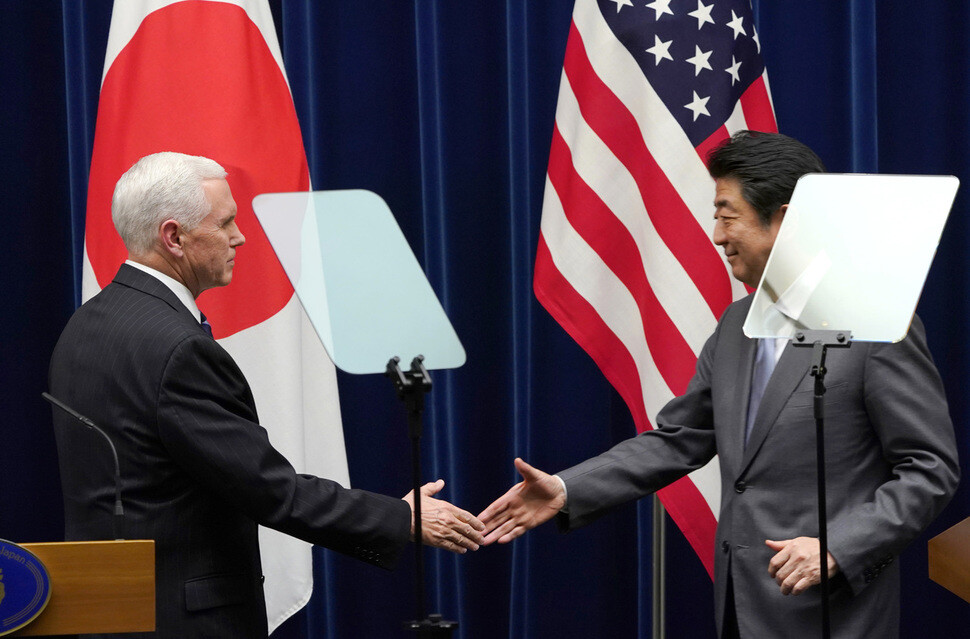hankyoreh
Links to other country sites 다른 나라 사이트 링크
Pence: US to unveil “toughest and most aggressive round of sanctions” on North Korea

US Vice President Mike Pence said that the US plans to soon unveil the “toughest and most aggressive round of economic sanctions on North Korea ever.”
Pence’s remarks came following a meeting in Japan with Prime Minister Shinzo Abe on Feb. 7, a day ahead of the Vice President’s visit to South Korea. Pence also expressed a skeptical stance on scenes of inter-Korean unity at the Pyeongchang Olympics, including use of the Korean Peninsula flag.
“We will continue to intensify our maximum pressure campaign until North Korea takes concrete steps toward complete, verifiable and irreversible denuclearization,” Pence declared during a joint press conference with Abe. He also echoed US President Donald Trump’s previous remarks about “all options” being on the table.
“We will not allow North Korean propaganda to hijack the message and imagery of the Olympic Games,” said Pence, who is heading a US government delegation visiting the Pyeongchang Olympics opening ceremony.
“We will not allow North Korea to hide behind the Olympic banner the reality that they enslave their people and threaten the wider region,” he added.
Pence also voiced skepticism about the use of the Unification Flag and unified South and North Korea teaming, recalling that the two sides marched under the same flag in the past. In particular, he noted that North Korea had continued with threats and provocations after the two sides previously entered with the Unification Flag at the 2000, 2004, and 2006 Olympics.
North Korea’s first nuclear test came eight months after the 2006 Winter Olympics ended, he added.
Pence said he would be traveling with the father of Otto Warmbier, a US university student who died soon after returning from detention in North Korea.
“[W]e pledge to honor Otto’s memory [with] American resolve,” Pence tweeted on Feb. 6.
Pence also decried human rights conditions in North Korea. Describing North Koreans as living in prison-like conditions, he said, “An estimated 100,000 North Koreans suffer in gulags, toiling in forced labor, and enduring torture, starvation, rape, and murder on a constant basis.”
Abe similarly devoted most of his remarks to pressuring Pyongyang.
“I laud the fact that inter-Korean dialogue is taking place for the success of the Pyeongchang Olympics. But we cannot simply look on as North Korean continues to develop nuclear weapons and missiles,” he said.
“[Pence and I] agreed that we must not let ourselves be distracted by North Korea’s ‘smile diplomacy,’” he added.
“At the Japan-South Korea summit during my visit to South Korea to attend the Pyeongchang Olympics opening ceremony, I would like to confirm with President Moon Jae-in the approach confirmed by Japan and the US and show that the firm relationship of cooperation among Japan, the US, and South Korea on North Korea policy remains unshaken.”
That morning, Pence inspected a unit operating PAC-3 interception missiles positioned by Japan to prepare for a North Korean missile launch.
By Cho Ki-weon, Tokyo correspondent
Please direct questions or comments to [english@hani.co.kr]

Editorial・opinion
![[Column] Park Geun-hye déjà vu in Yoon Suk-yeol [Column] Park Geun-hye déjà vu in Yoon Suk-yeol](https://flexible.img.hani.co.kr/flexible/normal/500/300/imgdb/original/2024/0424/651713945113788.jpg) [Column] Park Geun-hye déjà vu in Yoon Suk-yeol
[Column] Park Geun-hye déjà vu in Yoon Suk-yeol![[Editorial] New weight of N. Korea’s nuclear threats makes dialogue all the more urgent [Editorial] New weight of N. Korea’s nuclear threats makes dialogue all the more urgent](https://flexible.img.hani.co.kr/flexible/normal/500/300/imgdb/original/2024/0424/7317139454662664.jpg) [Editorial] New weight of N. Korea’s nuclear threats makes dialogue all the more urgent
[Editorial] New weight of N. Korea’s nuclear threats makes dialogue all the more urgent- [Guest essay] The real reason Korea’s new right wants to dub Rhee a founding father
- [Column] ‘Choson’: Is it time we start referring to N. Korea in its own terms?
- [Editorial] Japan’s rewriting of history with Korea has gone too far
- [Column] The president’s questionable capacity for dialogue
- [Column] Are chaebol firms just pizza pies for families to divvy up as they please?
- [Column] Has Korea, too, crossed the Rubicon on China?
- [Correspondent’s column] In Japan’s alliance with US, echoes of its past alliances with UK
- [Editorial] Does Yoon think the Korean public is wrong?
Most viewed articles
- 1‘We must say no’: Seoul defense chief on Korean, USFK involvement in hypothetical Taiwan crisis
- 2N. Korean delegation’s trip to Iran shows how Pyongyang is leveraging ties with Moscow
- 346% of cases of violence against women in Korea perpetrated by intimate partner, study finds
- 4[Column] Park Geun-hye déjà vu in Yoon Suk-yeol
- 5‘Weddingflation’ breaks the bank for Korean couples-to-be
- 6Will NewJeans end up collateral damage in internal feud at K-pop juggernaut Hybe?
- 7Amnesty notes ‘erosion’ of freedom of expression in Korea in annual human rights report
- 8[Interview] Dear Korean men, It’s OK to admit you’re not always strong
- 9Korean government’s compromise plan for medical reform swiftly rejected by doctors
- 10[Editorial] Japan’s rewriting of history with Korea has gone too far